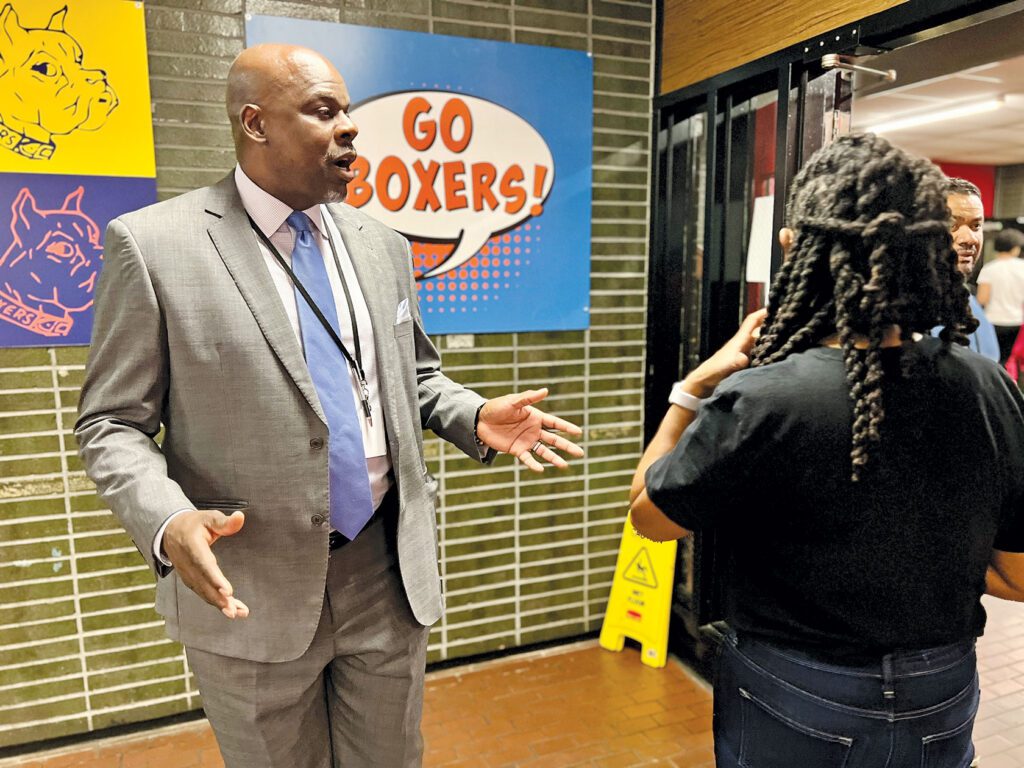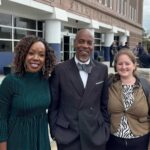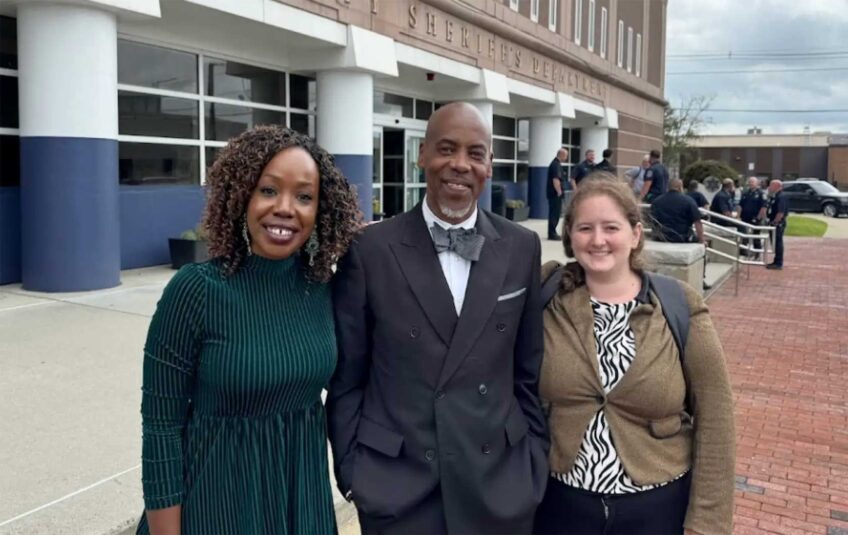
Since January, Brockton High School Principal Kevin McCaskill has been rebuilding the foundation for quality public education in the City of Champions. He is confident that a critical mass of teachers, administrators and parents will come together to support student learning.
The principal is looking past summer vacation, well aware of the work ahead. Plans for fall’s first days of school and new student orientation are being crafted by teachers and administrators in working groups now, he said.
His optimism marks a rebound of sentiment following a winter during which budget deficits, teacherless classrooms and spiraling safety concerns were battering public trust in the school.
Since the February break, headlines about the predominant public high school in New England’s only majority-Black city have improved. The Brockton High Drama Club finished first at the Massachusetts Educational Theatre Guild Competition in March — “state champions,” McCaskill said; Livingstone College, an historically Black college in North Carolina, offered scholarships to students with good grades; the school was designated for work-based learning partnerships with local employers; and the Brookline Center’s “bryt” program brought mental health support to students in need.
Graduation festivities kicked off June, but the students continue to compete and excel. Over the weekend, a team of coders was programming autonomous drones at a national event in Los Angeles. . Track phenom Lucas Andrade ran in the New England track and field championships Saturday. The school’s Marciano Stadium played host to the Brockton Public Schools Special Olympics on June 11.
Low staffing levels have hampered academic learning at Brockton High. Even so, dedicated individuals excelled on their own merits. BPS established a club for students with perfect MCAS scores last fall.
“We have some high-flying students,” McCaskill said. For the focused, Brockton High has rigorous offerings like AP classes, an International Baccalaureate Diploma Program and dual-enrollment with higher-ed institutions.
“You have students going on to major universities and colleges throughout the country,” he said, noting that in the humanities, “kids excel.”
He argued, however, that more support is needed for “students who are in the middle,” disengaged or struggling. He sees the needs as both academic and social-emotional.
“We’ve got quite a bit to work on,” he said. “That’s no big secret.” But, he countered, there’s been a reduction in violence. “You don’t see the massive numbers” of students in the cafeteria anymore, he said while acknowledging “wandering is still an issue.”
Financial challenges
McCaskill is preparing for level staffing next year and beyond. If the financial situation improves, he hopes to revisit some needed positions.
Brockton’s recent budget deficits cut into coverage of classrooms and hallways at Brockton High School. The district hired six new security specialists this winter, supplementing the team of a dozen.
Districtwide, 150 vacant positions — many teachers — went unfilled to save money. With that cost savings plus $5.1 million of custodial costs shifted into the Commonwealth’s American Rescue Plan Act fund, ESSER III, and other belt-tightening measures, municipal solvency was more or less secured. The City Council agreed to empty its financial reserves, however, leaving little room for future maneuvers.
TJ Plante, a consultant with Open Architects, which prepared a report earlier this year on school finances, told the school committee last week that he’s “reasonably confident” a $19-$25 million deficit projected in January would shrink. Many factors remain uncertain through the end of the fiscal year, but future taxes may ultimately make up for some $4.1 million of costs that are otherwise unaccounted for.
Still, the city’s financial straits are profound. Discussing next year’s budget in a subcommittee, school committee members had to consider underfunding “critically needed positions” that offer legally required services to students with disabilities. Ultimately voting to request funds that may never materialize, the body was hard pressed to willfully jeopardize its essential duties. Furthermore, federal funding allocated under the Individuals with Disabilities Education Act (IDEA) prohibits the cuts.
As one financial expert explained at the meeting, the higher amount reflected “the positions necessary to open the doors and give just the same level of service to the kids who are eligible in June, what they need in September.” He went on to say students with disabilities were enrolling at a disproportionate rate relative to overall enrollment. Students eligible for services under the IDEA made up 16.6% of the district in FY20; 19.6% on Oct. 1; and “almost 22%” on June 1.
New arrivals strain system
Even with staffing stability, Brockton’s schools may be slowly slipping behind. After enrollment is counted for funding purposes on Oct. 1, hundreds of new students arrive mid-year.
“New students means more teachers,” said Dr. Karen Spaulding, the assistant superintendent for elementary-level teaching and learning, noting that the 239 elementary students enrolled after October would ordinarily necessitate 10 new teachers.
“I can’t sound the alarms enough,” she said, even though welcoming new students to the classroom is a “wonderful good-news story.”
McCaskill estimated the high school’s enrollment had increased by more than 200 students since October.
New immigrants have presented a particular challenge, since effective teachers need fluency in students’ native languages.
“At the middle school levels,” explained Kellie Jones, Brockton’s director of bilingual education, “some Haitian classes have over 40 in them — and we have classes at the high school that have higher than 70. They are being taught in lecture halls.”
Brockton Public Schools is serving 1,324 new multilingual learners compared with September 2023. Almost half of these new arrivals speak Haitian Creole. English Language Learner enrollment is now over one-third of the district’s student population.
McCaskill is aiming for a multi-year turnaround while remaining realistic about the 2025-26 academic year. Striking a resolute note, he said: “I can say unequivocally this will work.”






